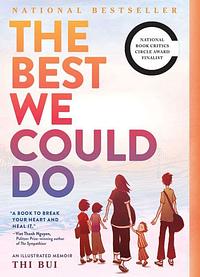You need to sign in or sign up before continuing.
Take a photo of a barcode or cover
challenging
emotional
reflective
fast-paced
Brilliantly done. Loved everything about this. So much intention, so carefully crafted I couldn’t put the book down. So rich and complex. The realizations deeply profound yet seemingly effortless.
dark
emotional
reflective
slow-paced
really beautiful & haunting look at a family's history before, during, and after the vietnam war and the impact that ripples through the generations. I read this like last week so i've now forgotten the specifics of what i wanted to say in this but i really loved it and thought the author used color really beautifully to create throughlines
Add this shining debut [did I just say "shining debut"?! I STAND BY IT] to the shelf of graphic novels you feel safe recommending to people who "don't read comics" -- Persepolis and Maus, of course, and anything by Rutu Modan. Expressive, accessible art and text that could just as easily be found in the "Heartwarming Personal Essay" feature on the last page of NYT Magazine.
The birth of her son prompts Bui to reflect on her relationship with her own parents, refugees from Vietnam who endured unknowable hardships to build a safe life for Bui and her siblings in America. Holding her infant child, she reevaluates her parents' lives, the walls they constructed to survive, and the sacrifices they made to usher their children to adulthood. A Refugee's Sadness lingers in Bui, despite having no memories of Vietnam, and she wonders, "How much of ME is my own, and how much is stamped into my blood and bone, predestined?" You don't have to descend from refugees for this question, or the book, to resonate.
No weird comic book-y stuff here: just a beautifully rendered reflection on family and history that happens to reveal itself through sequential art.
Go ahead and recommend it to your mom.
The birth of her son prompts Bui to reflect on her relationship with her own parents, refugees from Vietnam who endured unknowable hardships to build a safe life for Bui and her siblings in America. Holding her infant child, she reevaluates her parents' lives, the walls they constructed to survive, and the sacrifices they made to usher their children to adulthood. A Refugee's Sadness lingers in Bui, despite having no memories of Vietnam, and she wonders, "How much of ME is my own, and how much is stamped into my blood and bone, predestined?" You don't have to descend from refugees for this question, or the book, to resonate.
No weird comic book-y stuff here: just a beautifully rendered reflection on family and history that happens to reveal itself through sequential art.
Go ahead and recommend it to your mom.
Amazing. I am awed by the power of a good graphic memoir, and this is one of the best that I have read about the refugee experience, war, family, pain, life and death.
adventurous
emotional
informative
reflective
sad
tense
medium-paced
"The Best We Could Do" by Thi Bui left a profound impact on me. As a second-generation child of migrants, I often grapple with the feeling that my efforts may never measure up to the struggles my parents endured to reach this point. Bui's book helped me recognize that this sense of inadequacy echoes the sentiments my parents likely had towards their own parents—a cyclical pattern of emotions not unique to me. Even though the specifics of my parents' experiences differ from those depicted by Thi Bui. The overarching theme struck a chord with my own familial journey.
Bui's narrative explores how generational challenges can perpetuate feelings of disconnection and separation within immigrant families. It delves into the reasons behind using specific love languages such as home-cooked meals and random gifts, emphasizing actions over words. From a historical perspective, the book provided valuable insights into Vietnam and the refugee experience, enriching my understanding of these aspects through Bui's poignant stories.
Furthermore, the book delves into a crucial dynamic within the migrant community—the divide between those who "act like migrants" and those who strive to assimilate, rejecting aspects of their cultural identity. Overall, this book was truly exceptional. As a comic book lover, I appreciated the books layout, reminiscent of two other comics I enjoy: "Maus" by Art Spiegelman and "Persepolis" by Marjane Satrapi.
Bui's narrative explores how generational challenges can perpetuate feelings of disconnection and separation within immigrant families. It delves into the reasons behind using specific love languages such as home-cooked meals and random gifts, emphasizing actions over words. From a historical perspective, the book provided valuable insights into Vietnam and the refugee experience, enriching my understanding of these aspects through Bui's poignant stories.
Furthermore, the book delves into a crucial dynamic within the migrant community—the divide between those who "act like migrants" and those who strive to assimilate, rejecting aspects of their cultural identity. Overall, this book was truly exceptional. As a comic book lover, I appreciated the books layout, reminiscent of two other comics I enjoy: "Maus" by Art Spiegelman and "Persepolis" by Marjane Satrapi.
O melhor que podíamos fazer, mas que eternamente cobramos e seremos cobrados. Uma história de mãe e filha, de ancestralidade e compreensão do seu lugar no mundo. Uma história do Vietnã e seus intensos conflitos. Belíssima arte também com poucos tons, que reforçam o caráter de uma memória gráfica.
emotional
hopeful
sad
fast-paced
Graphic: Child death, Pregnancy, Colonisation, War




